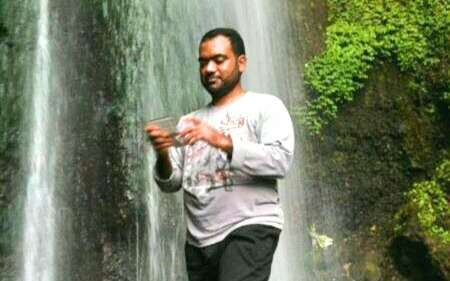**Update 23 April 2019 – Today, the Saudi government carried out the executions of 37 men, including Abbas al-Hassan. His case had drawn the attention of UN Special Procedures. The executions were reportedly carried out without prior notice to the families.
Abbas al-Hassan was a Saudi citizen and father of four from the Shia majority town of al-Ahsa in the Eastern Province, who had been convicted and sentenced to death in an unfair trial. He was executed on 23 April 2019.
Al-Hassan was arrested in June 2013 and detained along with 31 other men for alleged ties to Iran and espionage. The Saudi government held him incommunicado for up to three months, during which time they tortured him into confessing to the charges against him. The charges include treason and support of terrorism, as well as blatant political and religious charges – recruiting individuals to hinder the reputation of the Kingdom, supporting riots and protests, and supporting the spread of Shia doctrine. The Saudi government held al-Hassan in detention for three years while preparing the case against him, yet demanded that the defense be ready to proceed in only three weeks. On 6 December 2016, the Specialized Criminal Court in Riyadh sentenced al-Hassan and 14 other men to death, a decision which was upheld by the Appeals Court in July 2017.
The trial of al-Hassan and the other individuals was riddled with fair trial and human rights violations. All 32 men were arrested without a warrant and held incommunicado for up to three months, during which they were interrogated without the presence of a lawyer. The list of charges presented to the defendants was over 300 pages long and included crimes like high treason for “setting up or joining a spy cell or meeting with Iranian intelligence,” as well as crimes like “supporting protests,” “spreading the Shia faith,” and “possessing banned books and videos.” One of the charges against a defendant was possessing articles written by Saudi human rights and interfaith activist Mikhlif al-Shammari. The Saudi authorities tortured al-Hassan and other defendants to coerce confessions to these crimes. They further failed to provide the necessary documents to prepare a defense and withheld evidence used by the prosecution, such as USB drives, computers, and the coerced confessions and statements to investigators. In some cases the Saudi government did not even allow defendants to meet with attorneys. In addition, some of the men were threatened with solitary confinement or the arrest of their family members if they did not sign confession statements.
The charges of engaging in espionage with Iran were tinged with both religious and political considerations. Iran is a Shia majority country, while Saudi Arabia is a Sunni majority state. Saudi Arabia not only considers Iran its archenemy in the region, but accuses Iran of fomenting dissent among the Shia communities of the Eastern Province. All but one of the defendants in the case were Shia Muslims. This was also reflected in some of the charges against the defendants, which included “spreading the Shia faith or confession.”
The Saudi government’s actions towards al-Hassan were in violation of a number of international laws and instruments, including the right to life, fair trial rights and the principle of non-discrimination in the Universal Declaration of Human Rights and the Arab Charter for Human Rights, as well as the prohibition of torture in the Convention Against Torture and Other Cruel, Inhuman or Degrading Treatment or Punishment.
ADHRB strongly condemns the unfair trial, sentencing, and execution of al-Hassan. We call upon the government of Saudi Arabia to provide his family compensation for his arbitrary detention, torture, unfair trial, and execution in violation of international human right law. Finally, we call upon the Government of Saudi Arabia to place a moratorium on the death penalty.





